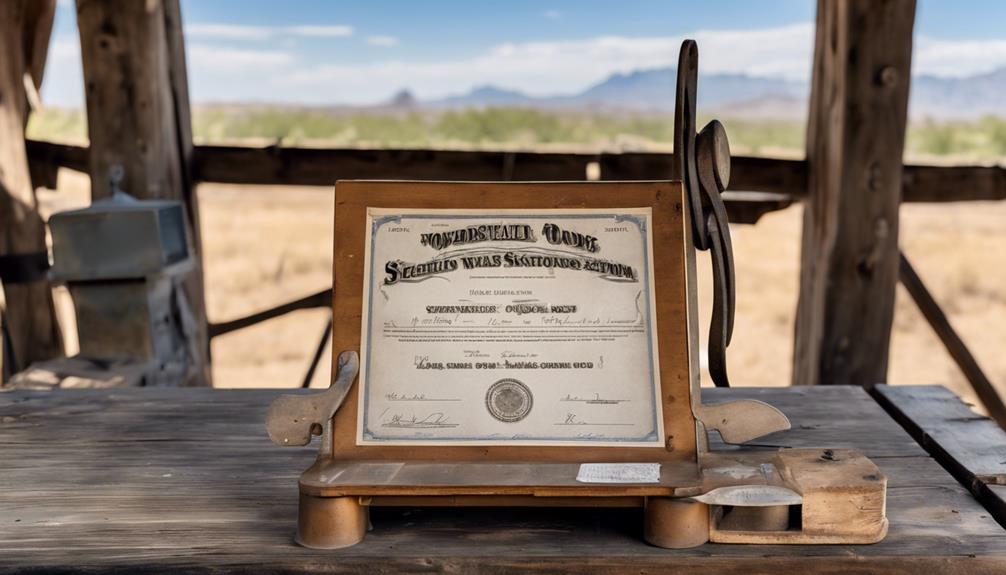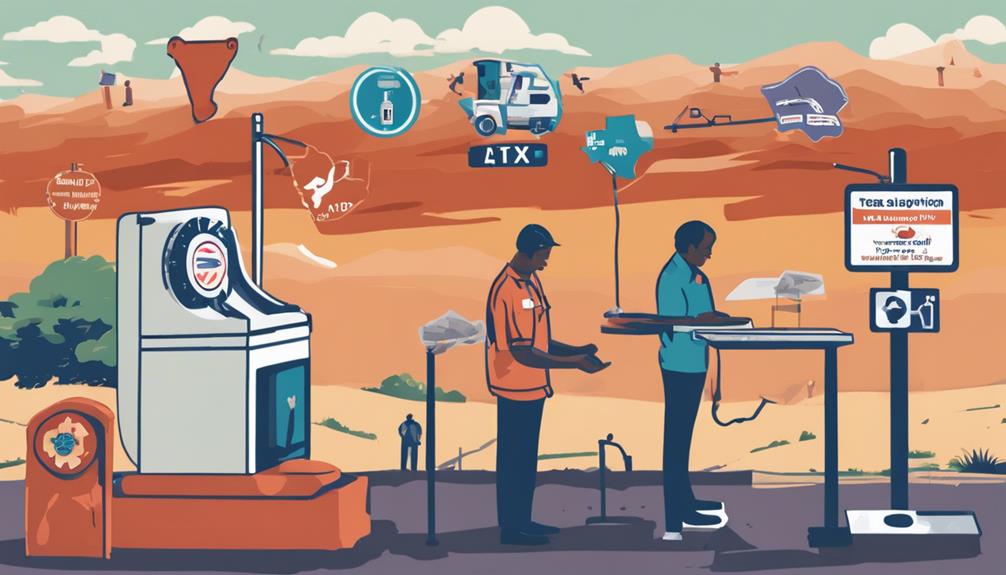When you're involved in weighing agricultural products in Texas, understanding the Texas Public Weigher Bond is essential. This bond isn't just a legal requirement; it serves to protect both you and your clients from potential inaccuracies and fraud in weight measurements. You might wonder who actually needs this bond or how it impacts your business operations. As you navigate this landscape, you'll find that the implications go beyond just compliance. What happens if you choose not to secure this bond?
What Is a Public Weigher Bond?

Understanding a public weigher bond is crucial for anyone involved in the weighing and selling of agricultural products in Texas. A public weigher bond is a type of surety bond required by the state for individuals who operate as licensed public weighers. This bond ensures that you accurately weigh and report the weight of agricultural products, such as livestock or grains, in compliance with Texas regulations.
When you obtain a public weigher bond, you're essentially guaranteeing that you'll adhere to the standards set forth by the Texas Department of Agriculture. If you fail to comply with these regulations or if you engage in fraudulent practices, the bond provides a financial safeguard for affected parties. It means that if there are losses due to your actions, the bond can cover those losses up to a specified amount.
To get a public weigher bond, you'll need to work with a surety bond company, which will evaluate your financial standing and the nature of your business. By securing this bond, you not only protect yourself but also build trust within the agricultural community, ensuring fair practices in the industry.
Importance of the Texas Public Weigher Bond
The Texas public weigher bond is vital for anyone involved in the agricultural industry, as it ensures accountability and trust in the weighing process. This bond acts as a safeguard for both weighers and their clients, ensuring that all transactions are fair and transparent.
When you hold a public weigher bond, you're demonstrating your commitment to ethical practices, which can enhance your reputation in the community. Additionally, these bonds provide financial protection for consumers and ensure compliance with industry regulations, further promoting trust and reliability in your services.
Having this bond also protects you from potential legal issues. If a dispute arises over weight discrepancies, the bond provides a mechanism for financial recourse. This means you won't bear the full financial burden in case of mistakes or fraudulent activities. Your clients will feel more secure when they know you're bonded, which can lead to more business opportunities.
Additionally, the Texas public weigher bond is often a legal requirement, so having it can keep you compliant with state regulations. Non-compliance can result in penalties or even loss of your ability to operate as a weigher.
Ultimately, investing in a public weigher bond isn't just a legal formality; it's a critical component of building a trustworthy and successful weighing operation in Texas.
Who Needs a Public Weigher Bond?

If you're involved in buying or selling agricultural products in Texas, you'll need a public weigher bond. This bond is essential for anyone who operates as a public weigher, which includes individuals and businesses that measure the weight of goods for commercial transactions.
If you're working in the agriculture sector, such as grain, livestock, or cotton, you must be bonded to ensure you comply with state regulations. The bond protects consumers by guaranteeing that you accurately weigh the products being sold.
It also serves as a financial safety net, ensuring that you adhere to ethical practices in your weighing operations. If you misrepresent weights or engage in fraudulent practices, the bond provides a means for affected parties to seek compensation.
In addition to public weighers, any business that relies on weight for pricing or sales, such as warehouses and processing facilities, may also need to secure this bond.
Essentially, if your work involves weighing agricultural commodities for sale or trade, a public weigher bond is a requirement you can't overlook. It not only solidifies your credibility but also assures your clients that they can trust your measurements and transactions.
How to Obtain a Public Weigher Bond
Securing your public weigher bond involves a straightforward process that ensures you meet Texas regulations effectively.
First, you'll need to gather the necessary documentation, including your identification and any relevant business licenses. This information is crucial for the bonding company to assess your application. Additionally, you may want to review the specific bond amounts required in your area, such as those for Texas Surety Bonds.
Next, research and select a reputable bonding company that specializes in public weigher bonds. You can often find these companies online or through referrals.
Once you've chosen a provider, fill out their application form. Be prepared to provide details about your business and any financial information they may require.
After submitting your application, the bonding company will review it and determine your eligibility. If approved, you'll receive a bond amount that complies with Texas regulations.
It's essential to read the terms and conditions carefully to understand your responsibilities.
Cost of a Public Weigher Bond

Understanding the cost of a public weigher bond is crucial for budgeting your business expenses. The cost typically ranges from a few hundred to several thousand dollars, depending on various factors, including your credit score, the bond amount required, and the surety company you choose.
Generally, you'll pay a percentage of the total bond amount as a premium, which can be anywhere from 1% to 15%. Additionally, these bonds, like many others in Arkansas, serve to ensure compliance with state regulations, protecting both the business and the public against potential losses from non-compliance Arkansas Surety Bonds.
If you have a strong credit history, you might qualify for a lower premium. On the other hand, if your credit is less than stellar, expect higher costs.
It's also essential to consider that different surety companies may offer varying rates, so shopping around can help you find the best deal.
Keep in mind that the bond is usually renewed annually, so factor in those ongoing costs for your long-term budgeting. Additionally, some companies may charge fees for processing or underwriting your bond application, so be aware of those potential expenses as well.
Bond Requirements and Regulations
When applying for a public weigher bond, you'll need to be aware of the specific requirements and regulations that govern the bonding process in Texas.
First off, you must be registered as a public weigher with the Texas Department of Agriculture. This registration ensures you meet the necessary qualifications to perform weighing duties legally.
Your bond amount typically needs to be set at $10,000, which acts as a promise to adhere to the state's weighing laws. It's essential to obtain this bond from a licensed surety company in Texas. The bond serves as financial protection for the state and the public, ensuring you fulfill your obligations responsibly.
Additionally, you'll need to complete a bond application, providing details about your business and any prior experience in weighing. The surety company will then assess your creditworthiness and may require further financial documentation.
Once approved, you must file the bond with the Texas Department of Agriculture, along with any required fees.
Adhering to these regulations not only helps you operate legally but also builds trust within your community. So, make sure you understand and follow all requirements closely.
Consequences of Not Having a Bond

Operating without a public weigher bond can lead to serious repercussions for you and your business. First and foremost, you risk facing hefty fines and penalties imposed by state authorities. These financial burdens can seriously impact your bottom line and deter potential clients from working with you.
Additionally, without a bond, you're exposing yourself to increased liability. If a client claims they've suffered losses due to inaccuracies in your weighing services, you might find yourself in legal trouble without the financial protection a bond provides. This could result in costly lawsuits, damaging your reputation and future business prospects.
Moreover, operating without a bond can lead to the suspension or revocation of your public weigher license. This means you'd be unable to conduct business legally, which could disrupt your operations and lead to further financial losses.
Lastly, lacking a bond can limit your ability to secure contracts with larger companies that require proof of bonding as a prerequisite. This could significantly reduce your client base and overall revenue.
To protect your business and maintain credibility, securing a public weigher bond is essential.
Renewal Process for Public Weigher Bonds
Renewing your public weigher bond is a crucial step in maintaining your business's legitimacy and compliance with state regulations. It typically involves a few straightforward steps, ensuring you stay on the right side of the law.
Start by checking the expiration date of your current bond; you don't want to be caught off-guard.
Next, contact your surety bond provider to discuss the renewal process. They may require updated financial information or a review of your business practices. Be prepared to provide any necessary documentation to facilitate a smooth renewal.
Once you've submitted the required materials, your surety will assess your application. If everything checks out, they'll issue a new bond, often for a similar amount and terms as your previous one.
After receiving the renewed bond, don't forget to file it with the appropriate state agency. Keep copies for your records as well.
This proactive approach not only ensures compliance but also helps build trust with your clients. By staying ahead of your renewal, you can focus on running your business without unnecessary interruptions or legal issues.
Common Misconceptions About Weigher Bonds

What misconceptions do many folks have about weigher bonds?
First off, some believe that a weigher bond is just another insurance policy. While it does offer some protection, it's primarily a financial guarantee required by the state. This bond ensures that you, as a public weigher, comply with regulations and fulfill your duties honestly.
Another common myth is that obtaining a weigher bond is overly complicated. In reality, the process is quite straightforward. You typically need to provide basic information, pay the premium, and submit the necessary paperwork.
Some people also think that a weigher bond covers all types of liabilities. That's not true. It specifically protects against financial losses resulting from your weighing services, not other business activities.
Lastly, many assume that once they get a bond, they won't need to think about it again. However, bonds require renewal and adherence to any changing regulations, so it's essential to stay informed.
Benefits to Consumers and Weighers
Consumers and weighers alike enjoy several key benefits from having a Texas public weigher bond in place. For consumers, the bond acts as a financial safety net, ensuring that weighers adhere to regulations and maintain accurate scales. This means you can trust the weight measurements you receive, which is crucial when it comes to buying and selling goods.
If there's ever a dispute about the weight, the bond provides a means of compensation, giving you peace of mind.
On the other hand, weighers also benefit from the bond by enhancing their credibility. With a public weigher bond, you demonstrate your commitment to ethical practices and compliance with state regulations.
This builds trust with your clients, making them more likely to choose your services over competitors. Additionally, having a bond can streamline the licensing process, allowing you to operate more efficiently.
Conclusion
In summary, the Texas Public Weigher Bond is essential for anyone involved in weighing agricultural products. It not only protects consumers from inaccuracies but also boosts your credibility as a licensed weigher. By securing this bond, you show your commitment to compliance and trustworthiness in the agricultural community. Don't underestimate the importance of having this bond; it safeguards your business and builds confidence among your clients. Stay compliant, protect your reputation, and enjoy the benefits that come with it.


